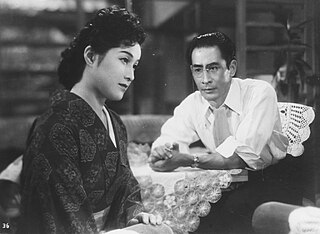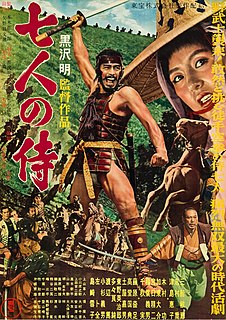 W
WThe Crucified Lovers is a 1954 Japanese film directed by Kenji Mizoguchi. It was adapted from Monzaemon Chikamatsu's 1715 bunraku play Daikyōji mukashi goyomi. The film was presented at the 1955 Cannes Film Festival,
 W
WDrunken Angel is a 1948 Japanese yakuza film directed by Akira Kurosawa. It is notable for being the first of sixteen film collaborations between director Kurosawa and actor Toshiro Mifune.
 W
WI Live In Fear is a 1955 Japanese drama film directed by Akira Kurosawa, produced by Sōjirō Motoki, and written by Kurosawa with Shinobu Hashimoto, Fumio Hayasaka, and Hideo Oguni. The film stars Toshiro Mifune as an elderly factory owner so terrified of the prospect of a nuclear attack that he becomes determined to move his entire extended family to what he imagines is the safety of a farm in Brazil.
 W
WThe Idiot is a 1951 Japanese film directed by Akira Kurosawa. It is based on the 1869 novel The Idiot by Fyodor Dostoevsky. The original 265-minute version of the film, faithful to the novel, has been lost for many years. A nearly three-hour release, reflecting a 100-minute studio-imposed cut, survives as the most complete version of the film available for contemporary audiences.
 W
WIkiru is a 1952 Japanese drama film directed and co-written by Akira Kurosawa and starring Takashi Shimura. The film examines the struggles of a terminally ill Tokyo bureaucrat and his final quest for meaning. The screenplay was partly inspired by Leo Tolstoy's 1886 novella The Death of Ivan Ilyich.
 W
WThe Lady of Musashino is a 1951 Japanese film directed by Kenji Mizoguchi. The script for the film was adapted by Mizoguchi from the best-selling serial novel by Shōhei Ōoka.
 W
WMiss Oyu is a 1951 black-and-white Japanese drama film directed by Kenji Mizoguchi. It is based on the 1932 novella The Reed Cutter (Ashikari) by Jun'ichirō Tanizaki.
 W
WThe Burning Sky is a 1940 black-and-white Japanese, war film produced and directed by Yutaka Abe, with special effects by Eiji Tsuburaya. The theme song was sung by Ichiro Fujiyama and composed by Kosaku Yamada.
 W
WPortrait of Madame Yuki , also titled A Picture of Madame Yuki, is a 1950 Japanese drama film directed by Kenji Mizoguchi.
 W
WThe Princess Sen is a color 1954 Japanese film directed by Keigo Kimura.
 W
WPrincess Yang Kwei Fei is a 1955 Japanese film directed by Kenji Mizoguchi. It was a co-production between Daiei Film and Hong Kong's Shaw & Sons, a predecessor of Shaw Brothers Studio. It is one of Mizoguchi's two color films, the other being Tales of the Taira Clan, made the same year.
 W
WRashomon is a 1950 Jidaigeki psychological thriller/crime film directed by Akira Kurosawa, working in close collaboration with cinematographer Kazuo Miyagawa. Starring Toshiro Mifune, Machiko Kyō, Masayuki Mori, and Takashi Shimura as various people who describe how a samurai was murdered in a forest, the plot and characters are based upon Ryunosuke Akutagawa’s short story "In a Grove", with the title and framing story being based on "Rashōmon", another short story by Akutagawa. Every element is largely identical, from the murdered samurai speaking through a Shinto psychic to the bandit in the forest, the monk, the rape of the wife, and the dishonest retelling of the events in which everyone shows his or her ideal self by lying.
 W
WSansho the Bailiff is a 1954 Japanese period film directed by Kenji Mizoguchi. Based on a 1915 short story of the same name by Mori Ōgai, which in turn was based on a folktale, it follows two aristocratic children who are sold into slavery.
 W
WScandal is a 1950 film written and directed by Akira Kurosawa. The film stars Toshirō Mifune, Takashi Shimura and Shirley Yamaguchi.
 W
WSeven Samurai is a 1954 Japanese epic samurai drama film co-written, edited, and directed by Akira Kurosawa. The story takes place in 1586 during the Sengoku period of Japanese history. It follows the story of a village of desperate farmers who hire seven rōnin to combat bandits who will return after the harvest to steal their crops.
 W
WStray Dog is a 1949 Japanese film noir crime drama directed by Akira Kurosawa and starring Toshiro Mifune and Takashi Shimura. It was Kurosawa's second film of 1949 produced by the Film Art Association and released by Shintoho. It is also considered a detective movie that explores the mood of Japan during its painful postwar recovery. The film is also considered a precursor to the contemporary police procedural and buddy cop film genres, based on its premise of pairing two cops with different personalities and motivations together on a difficult case.
 W
WUgetsu, also known as Tales of Ugetsu, The Tales of the Wave after the Rain Moon and Ugetsu Monogatari (雨月物語), is a 1953 Japanese romantic fantasy drama directed by Kenji Mizoguchi and based on stories in Ueda Akinari's 1776 book of the same name. It is a ghost story and an example of the jidaigeki genre, starring Masayuki Mori and Machiko Kyō.